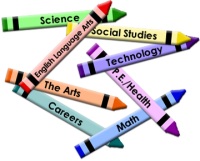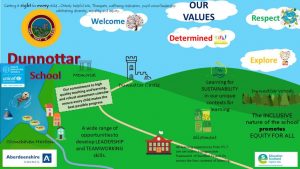
‘Curriculum for Excellence’ aims to enable all young people to become:
- Successful learners
- Confident individuals
- Effective contributors
- Responsible citizens
A Curriculum for Excellence will be based on seven principles which will underpin all the learning experiences of children and young people throughout their 3-18 education.
| No | Principle | Description |
|---|---|---|
| 1 | Challenge and enjoyment | Children should find their learning challenging, engaging and motivating. The curriculum should encourage high aspirations and ambitions for all. At all stages, learners of all aptitudes and abilities should experience an appropriate level of challenge, to enable each individual to achieve his or her potential. They should be active in their learning and have opportunities to develop and demonstrate their creativity. There should be support to enable children to sustain their effort. |
| 2 | Breadth | All children children should have opportunities for a broad, suitably weighted range of experiences. The curriculum should be organised so that they will learn and develop through a variety of contexts within both the classroom and other aspects of school life. |
| 3 | Progression | Children and young people should experience continuous progression in their learning from 3 to 18 within a single curriculum framework. Each stage should build upon earlier knowledge and achievements. Children should be able to progress at a rate which meets their needs and aptitudes, and keep options open so that routes are not closed off too early. |
| 4 | Depth | There should be opportunities for children to develop their full capacity for different types of thinking and learning. As they progress, they should develop and apply increasing intellectual rigour, drawing different strands of learning together, and exploring and achieving more advanced levels of understanding. |
| 5 | Personalisation and choice | The curriculum should respond to individual needs and support particular aptitudes and talents. It should give each child increasing opportunities for exercising responsible personal choice as they move through their school career. Once they have achieved suitable levels of attainment across a wide range of areas of learning the choice should become as open as possible. There should be safeguards to ensure that choices are soundly based and lead to successful outcomes. |
| 6 | Coherence | Taken as a whole, children’s learning activities should combine to form a coherent experience. There should be clear links between the different aspects of children’s learning, including opportunities for extended activities which draw different strands of learning together. |
| 7 | Relevance | Children should understand the purposes of their activities. They should see the value of what they are learning and its relevance to their lives, present and future. |
The existing CfE Guidelines for Scottish local authorities and schools cover the structure, content and assessment of the curriculum in primary schools and in the first two years of secondary education.
The aim of the Scottish Curriculum for Excellence programme has been to promote the teaching of a broad, coherent and balanced curriculum that offers all pupils continuity and progression as they move through school.
The curriculum taught at Dunnottar follows the guidelines set down in the national CfE documents.
Curriculum for Excellence Guidelines cover eight main curricular areas:
- Languages and Literacy
- Mathematics and Numeracy
- Sciences
- Expressive Arts
- Social Studies
- Health and Wellbeing
- Technologies
- Religious and Moral Education
Pupils’ progress is continually assessed by the class teachers, both on a formal and formative basis, and evidence is recorded in a variety of ways.
Learning and teaching
Teachers use a wide variety of teaching methods including, direct-teaching, discussion, investigation and creativity. Pupils work individually, in pairs and in groups.
The school’s approach to learning and teaching is based on the ‘Assessment if for Learning’ model:
- sharing learning intentions and success criteria with pupils
- effective questioning
- providing quality feedback to pupils with improvement point
- involving pupils in identifying how they can progress to the next step
- encouraging self and peer assessment
Follow the link to Education Scotland to find out more about each of the Scottish Curriculum for Excellence areas Link

